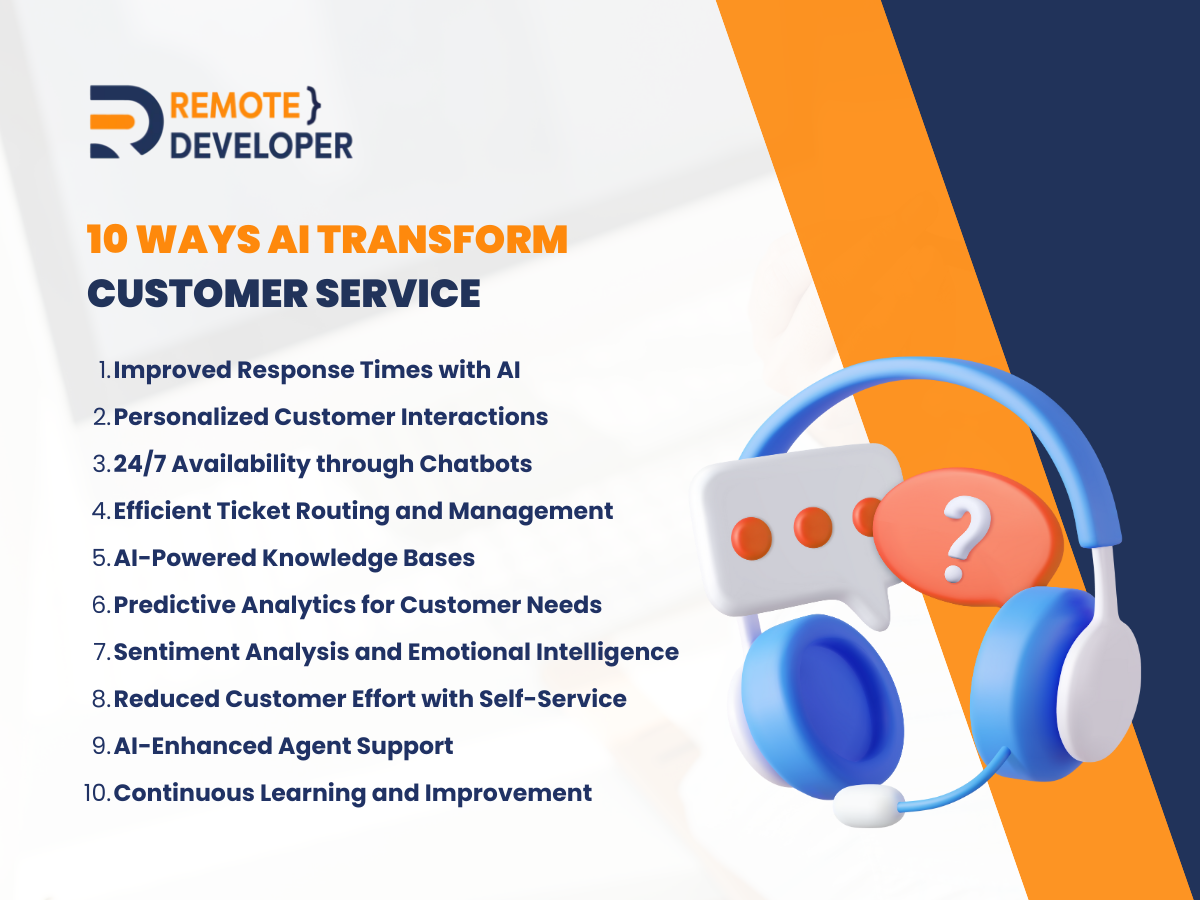Customer support and service have long been essential components of businesses across industries. They serve as the frontlines of interaction between a company and its customers, addressing inquiries, resolving issues, and building relationships.
However, the customer support landscape is rapidly evolving, thanks to artificial intelligence (AI) technology integration. The customer support and service landscape is undergoing a profound transformation driven by Artificial Intelligence (AI) integration. AI is reshaping how businesses interact with their customers and enhancing the quality of service they provide.
This article will explore ten ways AI is transforming customer support and service. We delve deep into how AI is reshaping customer support and assistance, paving the way for more efficient, personalised, and impactful customer experiences.
10 Ways AI Transformed Customer Service
Here are ten ways AI has ushered in a customer service revolution, fundamentally altering how businesses engage with their clientele. From lightning-fast response times to emotionally intelligent interactions, AI has paved the way for a new era of customer support.

Improved Response Times with AI
In today’s fast-paced digital world, customers have come to expect quick responses. In fact, according to HubSpot, ninety percent of customers consider receiving an ‘immediate’ response essential or critical when they have a customer service question.
Likewise, one of the most significant transformations AI has brought to customer service is response times. AI-driven chatbots and virtual assistants can instantly respond to customer queries 24/7.
Gone are the days of waiting on hold for extended periods or anxiously anticipating email responses. AI-driven systems analyse customer inquiries and provide relevant answers swiftly, enhancing customer satisfaction and loyalty. AI-powered chatbots can handle routine inquiries like FAQs, order tracking, or account information updates. This reduces the workload on human agents and ensures customers receive quick and accurate responses, ultimately improving the overall customer experience.
Personalised Customer Interactions
AI in customer service leverages data analytics and machine learning to deliver personalised customer interactions. By analysing past interactions, purchase history, and customer preferences, AI systems can tailor responses and recommendations to each customer. This personalisation creates a more engaging and meaningful interaction, fostering a stronger customer and brand bond.
Personalised recommendations enhance customer satisfaction and drive sales and cross-selling opportunities. For example, AI-driven recommendation engines can suggest complementary products based on a customer’s previous purchases, increasing the average order value.
24/7 Availability through Chatbots
Chatbots are the most visible technology of AI in customer support. These intelligent virtual assistants harness Natural Language Processing (NLP) to engage with customers in real time. They excel in answering frequently asked questions, providing product information, and guiding users through processes.
Notably, they operate 24/7, ensuring that customers receive assistance at any hour, thus eliminating the limitations of human availability. As such, chatbots reduce response times, improve efficiency, and free up human agents to focus on more complex tasks, making them a valuable addition to any customer support team.
Efficient Ticket Routing and Management
In organisations handling a high volume of incoming support requests, categorising and routing tickets to appropriate human agents or teams can be time-consuming. AI streamlines this process by automating ticket routing based on criteria like subject matter expertise.
When customers contact a business with a specific issue, AI algorithms can quickly assess the nature of the problem and route the ticket to the most suitable human agent. This ensures that customers receive assistance from the most qualified agents, reducing wait times and improving issue resolution rates. Additionally, AI in customer service can prioritise urgent issues, ensuring that critical problems are addressed promptly.
This ensures customer queries reach the most qualified individuals, leading to faster resolution times and heightened customer satisfaction.
AI-Powered Knowledge Bases
Customer service agents rely on knowledge bases to access information to assist customers. AI in customer service has transformed these knowledge bases by making them smarter and more accessible. AI algorithms can categorise and index vast amounts of information, making it easy for agents to find relevant answers quickly.
Moreover, AI-powered knowledge bases can suggest relevant articles or solutions based on the customer’s query, helping agents provide more accurate and timely support. This improves the efficiency of customer service operations and enhances the quality of customer interactions.
Predictive Analytics for Customer Needs
AI-driven predictive analytics is a game-changer in customer service. AI in customer service can predict future customer needs and issues by analysing historical data and behaviour patterns. This proactive approach allows businesses to address potential problems before they escalate, preventing customer dissatisfaction and churn.
For example, if AI detects a pattern of customer complaints related to a specific product, it can alert the company to investigate and address the underlying issue. Predictive analytics also enables businesses to offer targeted promotions and discounts, increasing customer retention and lifetime value.
Sentiment Analysis and Emotional Intelligence
Understanding customer emotions and sentiments is crucial for providing exceptional customer service. AI-powered sentiment analysis tools can analyse text-based customer interactions, such as emails, chat messages, and social media posts, to gauge the customer’s mood and sentiment.
Businesses can tailor their responses and support by recognising when a customer is frustrated, happy, or dissatisfied. This emotional intelligence allows companies to empathise with customers and provide a more personalised and empathetic customer experience.
Reduced Customer Effort with Self-Service
AI in customer service has empowered customers to take control of their service experience through self-service options. Interactive AI interfaces and knowledge bases enable customers to find answers to their questions or resolve issues independently without needing to contact a customer support agent. These portals use AI algorithms to suggest relevant articles, FAQs, or tutorials based on the customer’s query.
This reduction in customer effort leads to higher customer satisfaction and frees up human agents to focus on more complex and value-added tasks. Self-service options, such as AI-driven chatbots and FAQs, offer convenience and efficiency, aligning with modern consumers’ preferences for quick solutions.
AI-Enhanced Agent Support
AI doesn’t just transform the customer experience—it also supports customer service agents in their roles. AI tools can provide real-time suggestions and guidance to agents during customer interactions. These suggestions may include recommended responses, relevant knowledge base articles, or upselling opportunities.
AI in customer service enhances employee productivity and confidence by assisting them in real time, leading to more effective customer interactions. Additionally, AI can automate routine tasks, such as data entry or appointment scheduling, allowing agents to focus on more complex and relationship-building aspects of their job.
Continuous Learning and Improvement
AI’s transformative impact on customer service continues beyond initial implementation. AI systems are capable of continuous learning and improvement. As they interact with customers and collect more data, AI algorithms become smarter and more capable of providing accurate responses and recommendations.
This ongoing learning process allows businesses to stay ahead of customer trends and adapt to changing preferences. It also enables companies to fine-tune their AI systems to provide more personalised and effective customer service.
Embracing AI for Exceptional Customer Service
Artificial Intelligence has profoundly transformed customer service across various dimensions, from response times to personalised interactions and 24/7 availability. AI has improved the efficiency of customer service operations and enhanced the overall customer experience, leading to higher customer satisfaction and loyalty.
The ability of AI to analyse data, predict customer needs, and provide emotional intelligence has made it an invaluable tool for businesses seeking to excel in customer service. Additionally, AI-driven self-service options and agent support tools have made customer service more efficient and effective.
As AI continues to evolve and learn, it will undoubtedly play an increasingly critical role in shaping the future of customer service, providing businesses with the tools they need to meet and exceed customer expectations in an ever-changing digital landscape.
Contact us to learn more about how AI can benefit your business’s customer support and service!

